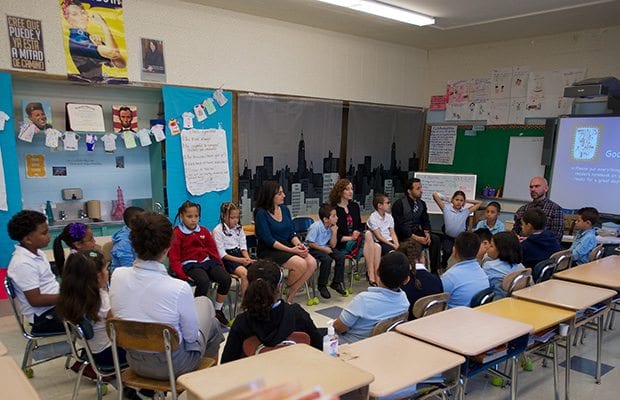

As children across Boston move forward into a new school year, opportunities to participate in social and emotional learning are available to thousands of students in dozens of Boston Public Schools member schools.
Partners HealthCare and its founding hospitals — Brigham and Women’s and Massachusetts General Hospital — are entering into the second year of their commitment to bring Open Circle — an exciting, nationally known curriculum — to the children of Boston.
Working with the Boston Public Health Commission, Open Circle is being implemented in 23 elementary and K-8 schools, reaching more than 7,000 students in Boston Public Schools.
“We are thrilled to continue our work with Partners and the Boston Public Schools to bring Open Circle to more of Boston’s youth,” said Barbara Ferrer, executive director of the Boston Public Health Commission. “Open Circle enables students to develop both intellectually and emotionally, which enriches the whole classroom experience. Moreover, it better prepares students to deal with the challenges they face beyond the school walls.”
The three-year program has already achieved nearly half of its goal, having reached 3,492 BPS students last year.
“We have had positive feedback from students, parents and teachers, which is why we are excited to expand the partnership,” said BPS Interim Superintendent John McDonough. “I wish everyone could see what we do in our Open Circle programs, because they are inspiring to watch.”
This school year, the Tobin School in Mission Hill has begun incorporating Open Circle into its classrooms and is making a difference for students and teachers.
“Open Circle has created a new kind of dialogue, not only among students, but also among faculty and staff,” said Tobin Principal Efrain Toledano. “It’s very exciting to see the impact and the increased comfort everyone has with expressing themselves — the whole school is more engaged on understanding the complexity of social interactions, emotions and ways to positively deal with these complex parts of the human experience.”
Open Circle teaches children important skills such as listening, sharing, cooperating, speaking up, calming down, expressing anger appropriately, recognizing dangerous and destructive behavior and problem solving. Students in Open Circle classrooms feel safe, connected and ready to learn.
Recent research has shown that social and emotional learning does more than just improve behavior — it can also help students make considerable academic gains. According to a 2011 review published by the journal Child Development, students, on average, gained 11 percentile points in reading and math when enrolled in a SEL program.
The Open Circle program was created locally in 1987 at the Wellesley Centers for Women at Wellesley College. Through the program, teachers implement the evidence-based Open Circle Curriculum during twice-weekly, 15-minute classroom meetings in which students form a circle of chairs with an empty seat to symbolize that there is always room for another participant, voice or opinion. In addition, all adults in the school community, from teachers to recess aides to parents, learn to model and reinforce prosocial skills throughout the school day and at home.
“We’re committed to developing an interactive learning experience for teachers and students that will continue to impact them over the course of their lifetime,” said Open Circle Co-director Nova Biro. “Social and emotional development is vital to success in school, work and life.”
Partners HealthCare is also excited about the promise of Open Circle programming and the potential long-term impact it can have on today’s students. Partners is focused on prevention, as demonstrated through its community commitments made possible by collaborations with local organizations like the Boston Public Health Commission and Boston Public Schools.
“Supporting Boston’s young people is of great importance to Partners,” said Matt Fishman, vice president for community health at Partners HealthCare. “Our collaboration with Open Circle and the city of Boston is another effective way we can work towards supporting the ongoing success of the youth in the communities we serve. Equipping students with the skills necessary for expressing themselves and solving problems constructively is essential not only for academic success, but also for continued success throughout their lives.”






